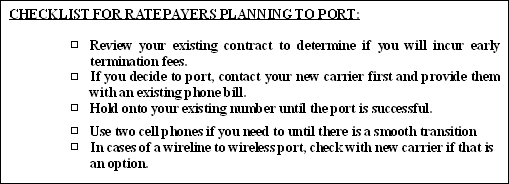

STATE OF NEW JERSEY
Division of The Ratepayer Advocate
31 Clinton Street, 11th Fl
P. O. Box 46005
Newark, New Jersey 07101
|
JAMES E. McGREEVEY |
SEEMA
M. SINGH, Esq.
|
|
Consu |
By Seema
M. Singh, Esq.
|Ratepayer Advocate
New Federal Communications Commission (FCC) rules
took effect November 24, 2003, that allow consumers to keep their existing cell
phone numbers when they switch carriers, ushering in the much awaited freedom of
choice and convenience of number portability.
But in the first few weeks of the new rule, the lack of readiness and poor implementation by most wireless carriers has made number portability the least-tested large-scale telecommunications implementation in history.
Ratepayers have had to deal with “technical bumps,” glitches and slowdowns caused by staffing inadequacies, breakdowns in business processes and computer and systems crashes, among other discrepancies. This has led to porting delays.
Wireless carriers initially projected two and a half hours to complete a port.
But the real time to port averaged around two and half days.
According to some analysts, most of the problems arose out of a lack of preparedness by carriers, who waited until June 2003 to pick their vendors. They should have started “stress testing” before then. Verizon was perhaps the only carrier that began gearing up for number portability early in the year, leading to a much more streamlined operation post November 24th.
Of the 12 million cell phone users projected to port in the first few weeks of
the new rule, only 1.5 million actually did. Out of the 50 million
consumers who are expected to switch their cellular carriers during the next 12
months, an estimated 40 percent may take their numbers with them. The other 60
percent may simply switch wireless providers and take a new number with the new
service. Because the actual number of consumers who ported their wireless
telephone numbers in the first few weeks of the new rule was significantly lower
than the projected figure, forecasters are now adopting a “wait and see”
approach in making any new predictions.
What
should wireless carriers do?
First, check if your wireless carrier is in one of the top 100 MSA’s where number portability is in effect by logging onto www.census.gov/population/cen2000/phc-t3/tab03.pdf. Ratepayers should note, however, that carriers can choose to provide customers with the ability to port in any market at any time. Verizon and T-Mobile have already started porting nationwide between the two carriers.
There are various ways to request your number to be transferred: on-line, over the phone or at a retail location.
Be sure to provide your new carrier with an old phone bill from your previous carrier so there is an exact match of the name and address, or the port may not go through. It is also recommended that customers do not cancel their previous phone service until the switch to the new carrier is complete. Be sure to review the status of your contract with the carrier you are leaving before switching to a new carrier to avoid early termination fees. You may need to carry around two cell phones for a while until there is a smooth transition.
In order to make porting go smoothly, ratepayers should contact their prospective new carrier, who will start the porting process. The new carrier must first confirm the consumer’s identity and then make a porting request to the old carrier. If ratepayers have a long-term contract with their existing carrier, they may be required to pay an early termination fee if they switch carriers and also pay any outstanding balances. But once a request to port is made, the old carrier may not delay or refuse to port a number even if there is an outstanding balance and the early termination fee has not been paid although the consumer is still responsible for these costs.
When is wireline to wireless
porting possible?
Wireline to wireless porting is also possible in some cases. Ratepayers should check with the prospective new wireless carrier to see if wireline to wireless porting is an option. If you port a number from a wireline phone to a wireless phone, your wireline long distance carrier will not move with you.

Remember the old saying, “Buyer Beware”! Telecommunications competition is fierce as companies vie for your business in the new climate of number portability. Carriers typically point out their strong points, not their weaknesses, in their advertising. Before you enter into any contract, carefully read the fine print and ask pertinent questions including whether there are any additional charges.
Many companies are offering a “flat rate calling plan”, which may lead you to think that you will be charged the price highlighted in large print every month. However, consumers pay more than the advertised price because that price does not include federal and state taxes and other charges such as a Universal Service Charge and a Subscriber Line Charge. There usually is an asterisk or a footnote in the upper corner next to the advertised rate directing you to the fine print where other applicable charges are listed.
Number portability brings with it convenience and greater freedom of choice. But it also entails the responsibility for consumers to do their homework to ensure that they make fully informed decisions on whether “to port or not to port.” Wireless carriers need to improve their performance to ensure consumers a smooth transition as they take advantage of number portability.
* * *
The Division of the Ratepayer Advocate is an independent state agency that represents the interests of utility consumers and serves as an active participant in every case where New Jersey utilities seek changes in their rates or services. The Ratepayer Advocate also gives consumers a voice in setting long-range energy, water, and telecommunications policy that will affect the delivery of utility services well into the future.
Additional information on this and other matters can be found at the Division of Ratepayer Advocate’s website at http://www.rpa.state.nj.us
ratepayer advocate: home
| electric
| gas
| telco
| water/wastewater
| news
& info. | press
releases | case
matters | publications
| consumer
info. | links |